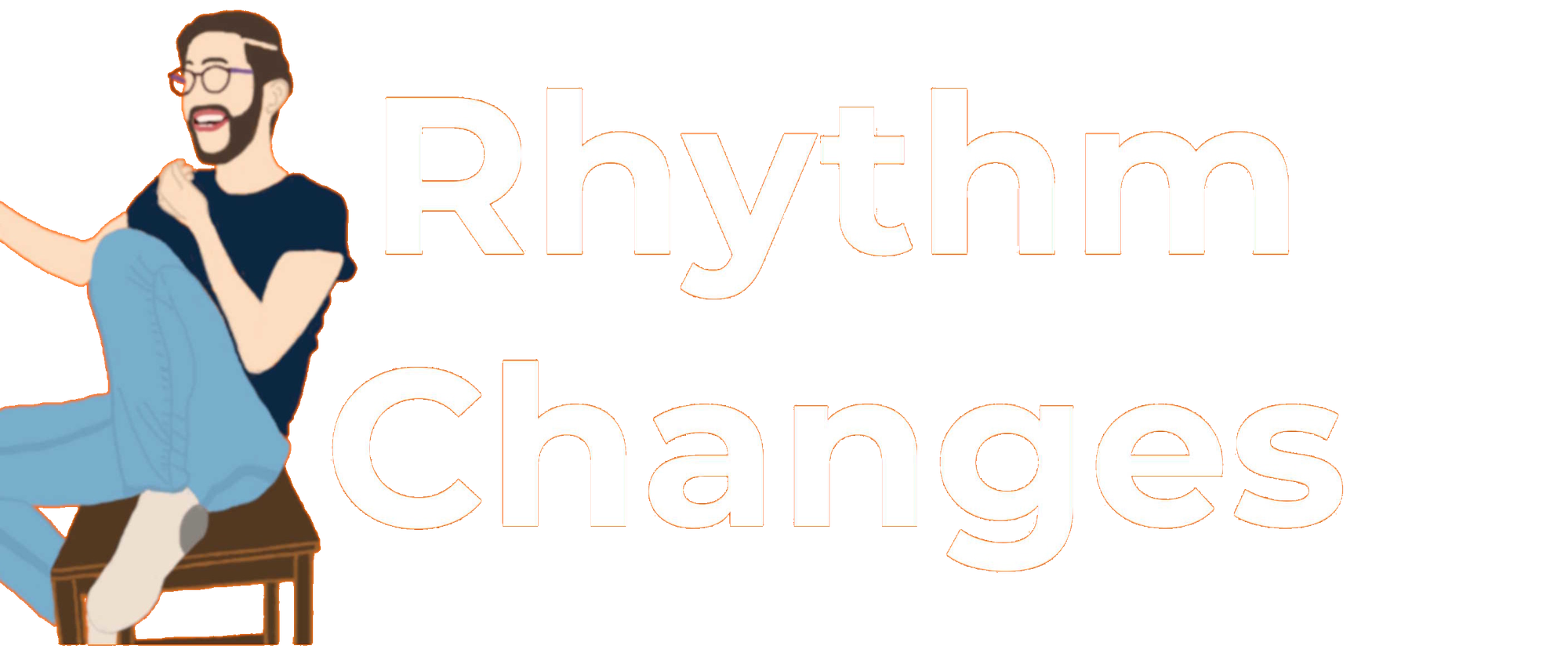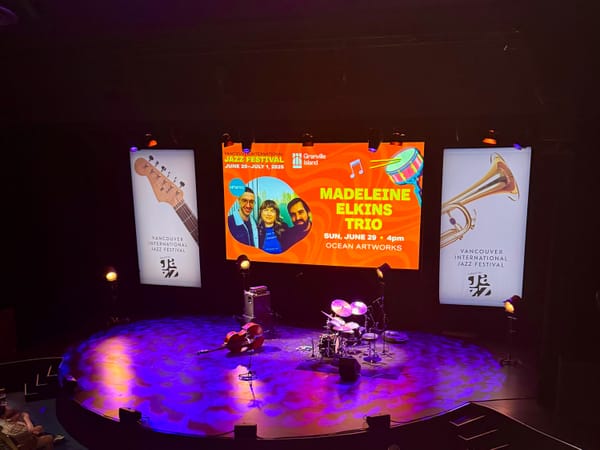The Tale of Terry Murphy (Introductory Story, No Guest)
Will Chernoff reads a brief story about the music industry to launch the podcast.

On the Rhythm Changes Podcast, Will Chernoff reads a brief story about the music industry to launch the podcast.
Listen to the show wherever you find podcasts, or tap here for links to some places:
1. The Tale of Terry Murphy
Once upon a time, Terry Murphy (whom I just made up) was a musician.
Thrice weekly on average, Terry packed his Kinal guitar and ZT amp out of his basement suite’s backyard door and drove his ’09 Corolla to a jazz gig. He was in-demand on the scene.
Terry usually performed in trios and quartets with his friends from Lonsdale University, where he studied from 2010-2017 and got a B. Mus. Once, the school even had the budget to fly out a jazz group from New York City for a masterclass! Terry will never forget how, in his jazz school’s top big band, he shared the stage with those legendary cats.
His favourite venues were the Cosine Cafe, which presented mostly standards by inexhaustible combinations of Lonsdale U grads; and the Chicken Cabaret, which presented any original band with a claim to sell 150 tickets. At these venues, Terry was a versatile guitarist and composer.
Terry’s best university friend worked at the summer jazz festival, so there was always a gig or two available for him there. All he had to do was apply with a nice bio alongside his two favourite SoundCloud tracks from his Live at the Tea and Cookies Studio demos:
Terry Murphy is a versatile guitarist and composer who has shared the stage with internationally-renowned jazz artists from New York City. He holds a B. Mus from Lonsdale University and is currently one of the most in-demand musicians on the local scene.
He used this bio every year, being proud of how every detail remained true.
2.
Terry and his best friend started a folk duo and began asking their Instagram followers to go follow their new account for the project. Remember when relationships were Facebook official? Bands were Instagram official.
One problem, though: no matter how professional Terry’s artist bio looked, this whole scene was a joke. On average, as a cut of the venue’s pay to the band, Terry earned about $80 per gig. At three gigs a week, that meant $240—before gassing up that Corolla—per week on average.
Good thing Terry and most, if not all, of the friends and colleagues he performed with were teachers.
Terry lost touch with some of his best buddies when they became high school band teachers. However, Terry’s partner reassured him that it wasn’t just his fault, that these teachers seemed stressed and often had to discuss classroom supplies and lesson planning, among other issues.
What Terry and his circle did instead of being high school band teachers was teach music lessons upstairs in the Lesson Centres of music stores. Terry taught at two: James Murphy (no relation) Music and Long & McQuade.
One of his friends taught at three Lesson Centres, cycling between them one day each for six days a week, and was close to saving a down payment for a townhouse in Powell River with her husband. Fortunately, there were Lesson Centres there too, and they never had enough teachers.
3.
After following up a day of teaching at James Murphy Music with an evening Cosine gig, Terry got home and sipped some Canadian Centennial whisky. He felt relaxed because he had solved a key problem and navigated the changing music industry. And, he had two gigs lined up the next two days on Friday and Saturday! Now, if only he could eke out a bit more time to go grocery shopping and cook gluten-free recipes with his partner, instead of eating on-the-go so often.
Terry’s parents said that in the 2000s, once CD sales started dying, you needed to tour to make a living. And if you couldn’t tour enough to do that, you had to teach.
Terry had a full teaching schedule and a big-break tour lined up with a neo soul band in summer 2020.
We all know what happened next. Now what was Terry supposed to do, not having the venues to tour or the Lesson Centres to teach?
Already spending lots of time on his phone, Terry took up several hours of Zoom lessons to fulfill his teaching obligations. This work formed the vast majority of his income for the next several months.
Terry saw headlines about a troubled music industry, including by way of one of his friends writing a weekly newsletter on the subject.
But he couldn’t have predicted the one experience that would change everything.
4.
During the pandemic, Terry started collaborating with a drummer friend who was stuck at home. They didn’t think too hard about the country-influenced songs they banged out on their own guitars and drums, or how their common jazz school history informed it. They just made some tracks together on the edges of their restricted lives.
Terry and his Country Fam friend were surprised at how easy it was to make an account with a digital distributor and get your music, which they mixed and mastered themselves, onto streaming stores. If it was this simple, they joked, why didn’t they make multiple albums this way while they were in jazz school together?
They called their duo project Retry because it was an anagram of Terry but also a real word, which was amusing.
The first track they distributed got 20,000 plays on Spotify in its first weekend, which was more than any of their friends had ever got.
As the plays for Retry’s first single went from 20,000 to 200,000 to two million over the next month, Terry and Country Fam wondered how? And why? Their track was more Kacey Musgraves than Luke Bryan, more progressive than bro-country, and it didn’t feel like it would get any attention.
Though the algorithms didn’t reveal their tricks, playlists gobbled up the track, and American radio stations picked it up as well.
Terry and Country Fam had 100% of the songwriting between them, so Terry made a publishing account with an administrator and registered it worldwide.
5.
Rather than plot their next move, the two hitmakers did the same sort of thing again. This time, they ended up with a song that wasn’t country at all; it sounded like something from that neo-soul band Terry was set to tour with. Regardless, they released it as Retry’s second single.
It didn’t matter that they crossed over genres. People who liked the first single found out about the second, and they ended up building slowly to six figures of stream totals again in the next few months.
Now Terry and Country Fam could plot.
Terry was shocked to find out that he would earn more money from the publishing and streaming sales of Retry’s first two songs than he had earned from all his gigs in the year 2019 combined. He felt privileged in the situation and didn’t discuss it much, especially due to the pandemic and its impact on almost all of his friends.
Country Fam floated the idea that he and his wife could finally get that townhouse in Powell River, using the publishing income and their savings as a stop-gap for their move. Country Fam was a gardener and dreamed of living off his own produce. But he found the Retry project so intriguing that he indulged another idea with Terry.
6.
- Country Fam, his wife, Terry, and Terry’s partner would all look together for a rental house in the Fraser Valley, far enough from the city centre to find some affordability. They even offered to put up Terry’s widowed father, who was getting up there in age, once they found a place. Terry’s dad would then rent out the house he owned, and maybe sell it later.
- The team of four would work together to set up a home recording environment and a home office to use for various remote work. Terry’s partner, who worked in finance and was the only non-musician or teacher, suggested that the other three could teach fewer lessons but try a higher hourly rate. In their other work time, the three would produce music for Retry all together and offer services for other artists. They would take care of the cover art and social media among themselves, and in a moment of optimism about the music industry, they felt grateful about running the project without needing to manufacture CDs.
- The four would also grow a vegetable garden together and work towards a 1/4 acre (sub)urban farm. YouTube proved to be an exceptional resource, along with trial and error.
After discussing all these points in detail, Terry and Country Fam finally talked to their partners about it for the first time. If they rented together successfully in this way for two or three years, they said, they could justify buying a home and continuing the lifestyle.
7.
Country Fam hated Amazon as a company, but the four leaned heavily on Prime deliveries in their first year of living near Hope, BC. They didn’t renew it for the second year.
Country Fam’s truck was the primary vehicle for the four, though Terry did bring his Corolla.
Terry’s partner picked up the heaviest load of gardening early on but got better at delegating the work — likewise with looking after Terry’s dad. Terry even coaxed his partner into the music-making process as a contributing singer/songwriter for Retry.
Country Fam’s wife, a saxophonist, learned the true meaning of being in the shed—she often felt the need to go to the literal woodshed for practice time in the morning. One of the Lesson Centres she worked at went out of business, and she successfully stewarded her woodwinds students from there into her solo remote teaching practice, also picking up a few more students from as far away as Yukon.
Terry panicked at around the one-year mark as the money from radio play went down, even though Retry had released almost twenty tracks by that time. He eventually realized that streaming was becoming so much more popular that it was cannibalizing the radio listening audience. Unfortunately, streams paid less than radio plays. But the Retry catalogue was growing, and everyone in the house was releasing music. Country Fam even got a song placed in a movie through some friends in Vancouver.
On his website, Terry took down his old bio and EPK and replaced it with a landing page that simply linked to Retry. He closed down all his Instagram accounts except one that featured mostly garden photography.
8.
Terry found that he liked gardening much more than he would have expected. He spent more time taking care of the hot composting setup than he ever did practicing. The analogy of gardening, and its uncertain but abundant rewards, to music was not lost on him or Country Fam.
The first time that a band booked the four’s home studio for a week-long destination recording session, the house was filled with anxiety. The four hired a veteran engineer friend and made sure it was safe from a public health perspective, but they were cagey as the band traipsed around their garden and working environment. They decided that they wouldn’t do it again until they owned the property and that they didn’t charge nearly enough in fees.
As the four considered their options for buying a place together, a desire for more personal space grew in each of their hearts. They were in their early- to mid-thirties, after all.
Terry Murphy didn’t know what exactly he or his housemates were now, but he knew that it all started once when he was a musician.





